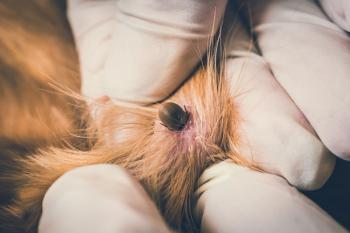
Leading Off: CAPC and AHS address heartworm preventive efficacy
Dr. Michael Paul discusses the joint statement, prompted by concerns of veterinary parasitologists and clinicians over regional reports of lack of efficacy of macrocyclic lactones used to prevent heartworm infection in animals.
The Companion Animal Parasite Council (CAPC) and the American Heartworm Society (AHS) have released a joint statement prompted by concerns of veterinary parasitologists and clinicians over regional reports of lack of efficacy of macrocyclic lactones used to prevent heartworm infection in animals. Representatives of both organizations—along with university clinicians with particular interest in heartworm disease and experts in pharmacology, parasitology, and resistance research—met to address the issues surrounding this lack of efficacy.
Michael Paul, DVM
The goal was to take steps to clarify current understanding about resistant populations of heartworms that at this time appear to be limited geographically to the upper and lower Mississippi River region. The consensus of the group was that resistance has indeed been demonstrated to occur. While such populations have been identified, it was stressed that a lack of dispensing consistency and client compliance are major factors that contribute to lack of efficacy.
The report stresses that macrocyclic lactones are the most important weapon in preventing heartworm infection currently available and that they should continue to be prescribed year-round as the need for improved client compliance is emphasized.
The report also outlines recommendations for testing protocols that take into account some life cycle concerns that are frequently misunderstood or neglected. Annual testing is still recommended, with additional testing recommended in some situations such as delayed initiation of preventive, which may allow for latent infections, or after a lapse in administration.
Although the emphasis of the discussions was on canine heartworm disease, effective prevention relies on monthly administration of a macrocyclic lactone to all dogs and cats year-round. Additional measures, including screening in kennels when possible, confining pets indoors during the heaviest hours of mosquito exposure, and the use of mosquito repellents, can significantly reduce exposure to infected mosquitoes.
Treatment protocols were discussed and agreed to by consensus. One of the most important outcomes was the admonishment not to use so-called "slow kill" or "soft kill" treatments. The treatment protocol outlined is the same as that described on the CAPC and AHS websites and emphasizes the administration of macrocyclic lactones, doxycycline, and melarsomine injected three times in the regimen.
Several key points from this meeting:
1. The extent of the lack of efficacy problem is not fully known. As more studies are done, amendments to this statement will be necessary.
2. The single greatest tool we have to prevent heartworm infection remains the macrocyclic lactone group of drugs.
3. The most basic step we can take to reduce lack of efficacy is to improve compliance, which involves veterinarians recommending and clients administering preventives.
4. The timing and frequency of testing must be linked to an understanding of the life cycle of heartworms.
5. Treatment is not complete until the patient is free of microfilaria.
6. Infected dogs should not be transported until proven clear of microfilaria.
The AHS and CAPC are extremely proud of the fact that this was a joint effort, and we look forward to future collaborations.
Dr. Paul is the executive director of the Companion Animal Parasite Council and a former president of the American Animal Hospital Association. He is retired from practice and lives in Anguilla, British West Indies.
Newsletter
From exam room tips to practice management insights, get trusted veterinary news delivered straight to your inbox—subscribe to dvm360.




